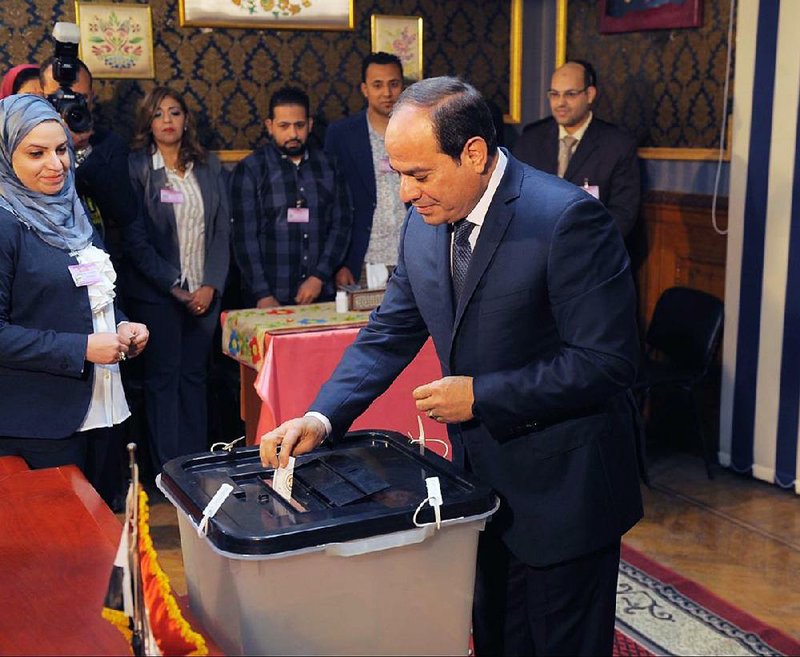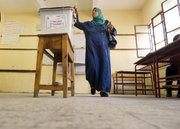CAIRO -- Egyptians began voting Monday in an election that virtually guaranteed another term for President Abdel-Fattah el-Sissi, who faced only a token opponent in balloting that resembled the referendums held by autocrats for decades before the Arab Spring briefly raised hopes of democratic change.
El-Sissi's only challenger was Moussa Mustafa Moussa, a little-known politician who joined the race at the last minute to spare the government a one-candidate election after several hopefuls were forced out or arrested.
Authorities hope enough of Egypt's nearly 60 million eligible voters will participate in the three-day election to give it legitimacy. Local media, which are dominated by pro-government commentators, have portrayed voting as a national obligation and the only way to prevent foreigners from sowing instability.
There were only modest lines at most polling places Monday, and some were empty for most of the day.
Officials overseeing four polling centers in the greater Cairo area said turnout hovered around a lowly 7 percent by 6 p.m. there, three hours before their scheduled close for the day. They said they expected a dramatic increase on the final day Wednesday.
El-Sissi, a general who led the 2013 military overthrow of Egypt's first freely elected president, the Islamist Mohammed Morsi, voted at a school in the Cairo suburb of Heliopolis as soon as the polls opened at 9 a.m. He made no comment before heading for a meeting with his campaign team.
Moussa, who supported el-Sissi until he joined the race, made no effort to mount a challenge, and the president never mentioned him once in public.
Replying to a reporter's question about his chances of winning, Moussa said: "It all depends on your prayers and your votes."
Some potential candidates might have attracted a sizable protest vote, but they were all either arrested or intimidated into withdrawing, making this the least competitive election since the 2011 uprising that ousted Hosni Mubarak.
The vote came amid the harshest crackdown on dissent in Egypt's modern history, with thousands of Islamists as well as several prominent secular activists in jail. Unauthorized protests are banned, most critical voices in the Egyptian media have been silenced, and hundreds of websites, including those of independent media and rights groups, have been blocked.
"I am not participating in this show because we all know who will win the vote," said Ahmed, a gas station attendant in Cairo's twin city of Giza.
"Nobody dares to speak up anymore, and if I go out and protest, I will either be killed with a bullet or thrown in jail," said the 30-year-old, who asked that only his first name be used because of those fears.
The national election commission reported a large turnout in Cairo, Alexandria and northern Sinai, the epicenter of an insurgency led by the Islamic State group, but gave no figures. Pro-government media dubbed the vote a "democratic feast."
Retired engineer Mohammed Ibrahim Ali patiently waited for the polls to open in Cairo's bustling Sayda Zeinab neighborhood, home to a famous Islamic shrine.
"Even if there are 1,000 candidates, we will vote for el-Sissi," he said, struggling to be heard over patriotic songs blaring from speakers. "He is the one who makes life great here."
Ahmed Abdel-Atti, a 58-year-old doorman in the same neighborhood, voiced skepticism.
"Do you see any other candidates?" he asked.
Many Egyptians had welcomed the military overthrow of Morsi, whose divisive rule had brought mass protests, and the subsequent crackdown on the Brotherhood. For a time, el-Sissi enjoyed a wave of popular support, but that aura has faded in the past four years.
In the Sinai Peninsula, the insurgency that gained strength after Morsi's overthrow has only grown more ferocious, with regular attacks on security forces and deadly church bombings.
Meanwhile, the government has enacted a series of economic overhauls, including subsidy cuts and the flotation of the currency. That improved the investment climate and earned Egypt a $12 billion bailout loan from the International Monetary Fund. But the austerity measures sent prices soaring, exacting a heavy toll on ordinary Egyptians.
"I was a wholehearted [el-Sissi] supporter, but not anymore," said a man who recently lost his job in a telecommunications company and now works at a Cairo gas station. "Yes, there are big projects, but he takes from us, the poor, not from them, the rich. We are the people who are living day to day."
He also asked that his full name not be used, fearing trouble from authorities.
A Section on 03/27/2018


